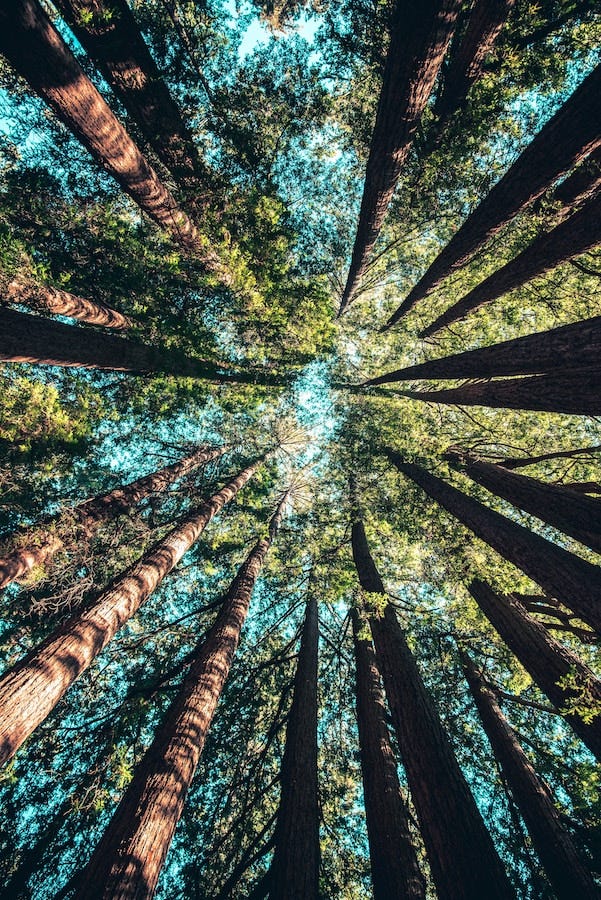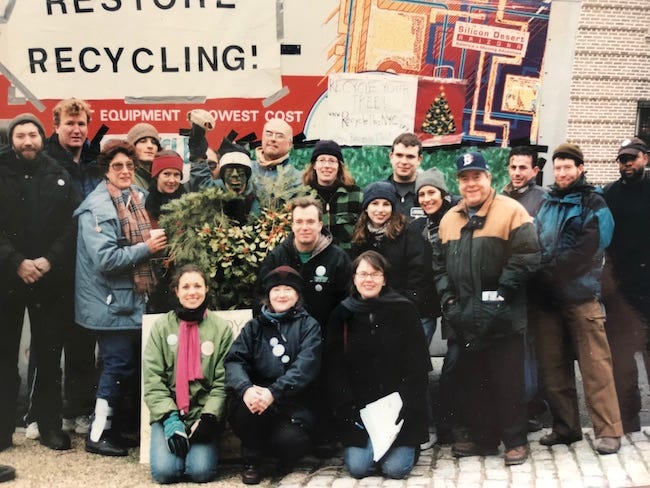The Commercialization of Earth Day Amidst its Origins and Ethos
We're so used to everything being commercialized - so how do we enact real change?
-Updated April 22, 2025. I originally wrote this piece a while ago and it seems almost quaint now but the ideals still hold. -
Happy Earth Day?
I suppose it was inevitable that Earth Day, founded 55 years ago, in 1970, would be co-opted. I stopped reading the countless emails from company after company I received this week exclaiming “Happy Earth Day!” with various offers and sales.
On the one hand, we all want to celebrate the Earth. Yay! But on the other, we want to really celebrate it, not via meaningless hype from companies that throw a few words in an email and on a product and yet everything else they do – from production, packaging and disposal – reeks of irresponsibility with profit before practice, irretrievably polluting our precious water, air and land.
With the environment a hot topic and a marketers’ dream to boot, how do we discern what’s real and what’s “green washing“? Even newer, small companies on the scene boasting “organic” “sustainable” “local” can start to appear less about being authentic and more about jumping on a trend.
How Earth Day Began in 1970 and What It Meant
On the 40th Anniversary of Earth Day in 2010, author, activist and professor Brian Tokar wrote at the Indypendent, “Reclaiming Earth Day — With Climate Chaos on the Horizon, the Environmental Movement needs Traction” reflecting on its origins:
While environmental awareness has seeped into mainstream U.S. society since the 1970s — the era when 20 million people hit the streets on Earth Day to demand action — the structures of power remain largely the same. The mass mobilizations around the original Earth Day helped spur then-President Richard Nixon to sign a series of ambitious environmental laws that helped to clean contaminated waterways, save the bald eagle from the ravages of pesticides and began to clear the air, which in the early 1960s was so polluted that people were passing out all over our cities. Most environmental victories since then have benefited from those changes in the law, but more fundamental changes seem as distant as ever.
… the original Earth Day on April 22, 1970, was initially a staged event. Politicians like Sen. Gaylord Nelson (D-WI) and Rep. Pete McCloskey (R-CA) took the lead in crafting the first Earth Day celebration that unexpectedly brought millions of people out around the country. The events, however, were supported by establishment institutions like the Conservation Foundation, a corporate think-tank founded by Laurence Rockefeller in 1948. Nixon even began the year with a presidential proclamation saying that the 1970s would be the “environmental decade.” …
To everyone’s surprise, Earth Day turned out to be the largest outpouring of public sentiment on any political issue to date. It drew public attention to environmentalism as a social movement in its own right. And it set the stage to pressure Congress to pass 15 major national environmental laws over a 10-year period and establish the Environmental Protection Agency (EPA).
In addition to the formation of the EPA, in the early 70s, under President Nixon, the Clean Water Act, the Clean Air Act, and the Safe Drinking Water Act were all passed.
Promise Unfulfilled?
It’s a great history, and yet, with all the uber-focus on the environment, it has not lived up to its promise. Tokar notes that legislation and our government have not kept up with the strides after that first Earth Day as many of the big environmental non-profits have allowed themselves to be co-opted, thereby losing their effectiveness and essentially their focus and mission.
A Story of Two Earth Days
Outside Grand Central Station in midtown Manhattan at a 2012 Earth Day event, a young man was handing out free Honest Tea and Odwalla* bars as I walked by with friends. He seemed enthusiastic and yet a bit disenfranchised about this task. As he walked by, he said (unironically), “Don’t forget to recycle.” It seemed he knew that it was part of a much larger conversation but he wanted to impart something to us. I was rendered speechless (is this what it’s come down to?) as he turned and walked away to hand out more Odwalla bars to people with their hands out eagerly awaiting them.
(*Honest Tea and Odwalla are both now owned by Coca Cola.)
Of course, he didn’t know that years prior (how is it so long ago now?), a group I founded, Recycle This!, held a table at this same Earth Day event (held indoors at that time). As a grassroots activist group, we had qualms about doing this event. We were worried it was too corporate, but we felt it was important to get the word out that Mayor Michael Bloomberg, then mayor of New York City, had cut recycling of plastics and glass - citing that the effort “cost too much.” This cutback of recycling was why our group was founded.
What we realized shortly after forming the group was that this effort was not just about recycling which can become a ‘feel good’ effort isolated from everything else. A larger look at the big picture was imperative; one which included reducing, reusing, & re-THINKING and also altering our consumption patterns. We realized much of the problem lies outside of the individual as companies use excess packaging without considering its disposal; the life cycle of a product is purposefully shortened so consumers need to buy more, and commercial businesses need to be taking a look at their disposal methods to keep items out of the landfill. (Yes!) We emphasized this at all the actions we did and events we organized. Some of this may be more widely known now - yet not enough has changed.
There was also another lesson here — the repercussions of that bad decision by NYC’s Mayor: 10 years later, with recycling reinstalled, the program still had not regained the levels of recycling rates it had achieved in 2002 (the halting and starting again caused much confusion and the media repeated back endlessly the mayor’s viewpoint on the “costs” involved) leading to New York City lagging behind most other cities.
In 2022, the amount of NYC trash that heads to a landfill (transported to another state) is 14 million tons, more than it was in 2002.
So What Do We Do?
The environment IS us. It reflects our care for, and the ways in which we inhabit, the earth. Our actions and inaction impact other species - it all interrelates. It’s simple in that way.
Right now, so much (or, in many instances, all) emphasis by marketers and media is being placed on the individual — you and me. What WE buy; our environmental consciousness is being promoted as key to the salvation of the environment. When plastic straws were banned in certain areas, it felt like the smallest tip of the iceberg yet it galvanized support. As Jennifer Grayson wrote in her piece, Forget Earth Day?, (note: no one seems to be grappling with this, years later) the problems are “the powers that be (Big Oil, Big Ag, Big Chem)” and the co-opting of our elected officials by lobbyists and big corporate money. We are not going to find corporate America or our government doing the right thing. But they can be pressured to do so ultimately.
Be Informed. Be Active.
This is beyond a debate over purchasing Seventh Generation* vs. Tide. While that is important, it’s SO much larger than that. It is important is to be as informed and authentic and active as possible. With social media, perhaps we are all a bit more informed but our focus is more scattered but it remains important: as a person, business owner, consumer, parent, member of your community and inhabitant of this world.
Independent, local, sustainable, fair trade, organic, cruelty-free, petrochemical-free – these are ALL important. What’s equally or more important is that people are INVOLVED in their lives and communities and beyond – in decisions in our lives and in what’s going on around them. That first Earth Day – even as a politically contrived “staged event” – changed things.
But we need things to change faster. bigger. smarter. We’re at the mercy of a political system that is largely rigged and inefficient. But we – each one of us – can be doing things, and, in effect, making that change happen. We have a long way to go.
*Seventh Generation remained one of the few independent successful companies that had not been subsumed into a larger corporate entity until 2016 when Unilever purchased the brand.
**********************************************************
Michigan State University put together these charts illustrating Who Owns What in the Organic Industry (2020)
Mother Nature Network looks back at the environment in the U.S. over the last 42 years (warning: this chart is a bit depressing)
Image #1: Casey Horner via Unsplash
Image #2 (rose and grasshopper, Brooklyn): Cathryn
Image #3 (Recycle This! and Green Party picking up Christmas trees after streetside tree pick up and composting was cancelled under Mayor Michael Bloomberg. Here we are at Prospect Park Brooklyn with Borough President Marty Markowitz. We arranged for a private sanitation company to work with us and we went around picking up trees left at the curb in Park Slope and another time in Sunset Park; they were headed for the landfill otherwise. I’m in the front row papers in hand.): Photographer unknown





